Sivaraman*, (name changed) a conservancy worker, was on regular duty last month, collecting garbage in Chrompet. Just as he was handling some ‘household waste’ collected from a clinic in the locality, a syringe pricked his finger. “I could not bend my finger as it seemed to have been numbed by some traces of anaesthetic still present. I reported it to my head and the doctor from the clinic was warned. They were asked to dispose of bio-medical waste according to the rules,” the worker said.
This, however, is not a one-off incident in Chennai. Improper disposal of bio-medical waste is rampant and activists in the city are gravely concerned about the implications. Pugalventhan V, a social activist, is appalled at the indiscriminate dumping of bio-medical waste near Vandalur, which he has spotted for the fourth consecutive time now in as many months. Places such as Injambakkam, Thiruneermalai, Chembarambakkam, Anakaputhur, Kundrathur, Vandalur and Nazarethpet are a few of the sites where medical waste is dumped regularly in brazen defiance of rules.
Alarmed by the trend, Pugal has taken it upon himself to monitor some of the suburban areas and has been doing it for a few months now. He identifies the spots where bio-medical waste is dumped – usually around water bodies and landfills — and then takes necessary steps to report violations.
Rules flouted
The Bio-medical Waste Management Rules, 2016, state that the bio-medical waste generator (healthcare facilities) and the operator of the common bio-medical waste treatment and disposal facility (CBMWTF) shall be responsible for safe handling and disposal of bio-medical waste in any area. It enlists several rules for safe disposal mechanism of hazardous waste.
The licensed healthcare facilities are required to segregate the waste and sign up with the CBMWTF for the collection, transport, treatment and scientific disposal of biomedical waste. The approval for biomedical waste disposal is given by Tamil Nadu Pollution Control Board (TNPCB). G J Multiclave (India) Pvt Ltd, Kancheepuram district (for parts of Chennai, Kancheepuram and Tiruvallur districts) and M/s. Tamilnadu Waste Management Ltd, Maduranthakam Taluk (for North Chennai, parts of Kancheepuram, Tiruvallur, Cuddalore and Villupuram districts) are the two CBMWTFs allocated to cater to Chennai and surrounding districts.
Interactions with multiple stakeholders conceded how the norms are being flouted on the ground in Chennai.
Biomedical wastes categories and their segregation, collection, treatment, processing, and disposal options (Source: Biomedical Waste Management Rules, 2016)
Norm: According to the rules, soiled items contaminated with blood or body fluids like dressings, plaster casts, cotton swabs and bags containing residual or discarded blood and blood components should be segregated in yellow coloured non-chlorinated plastic bags. Pharmaceutical waste like antibiotics, cytotoxic drugs including all items contaminated with cytotoxic drugs, along with glass or plastic ampules and vials should be packed in yellow coloured non-chlorinated plastic bags or containers. The rules also enlist treatment options.
Reality: Surgical gloves, syringes, blood-smeared cotton and expired medicines are found discarded indiscriminately around the water bodies and landfills. These telling pictures expose the glaring violations on the ground.
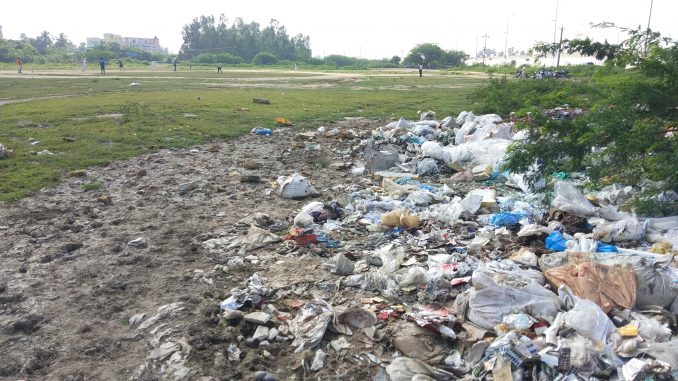
Several sacs containing bio-medical waste trashed by waterbodies. Pic: V Pugalaventhan
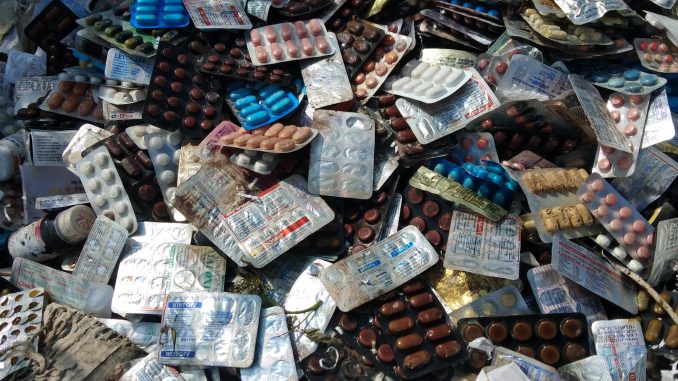
Expired medicines are also found in the sacs. Pic: V Pugalaventhan
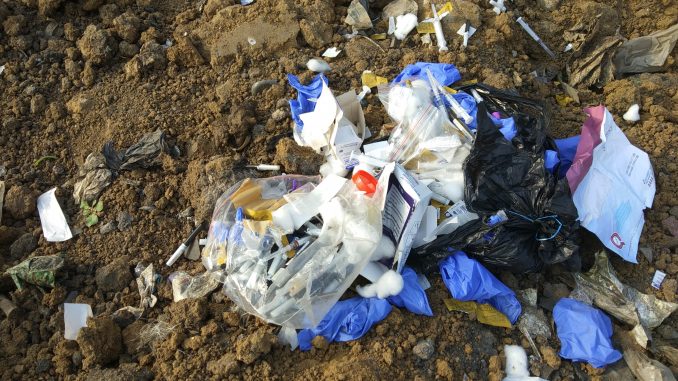
Bio-medical waste found for the fourth consecutive time near the suburban Mannivakkam lake, Vandalur. Surgical gloves, syringes, blood-smeared cotton and expired medicines are among the waste discarded. Pic: V Pugalaventhan
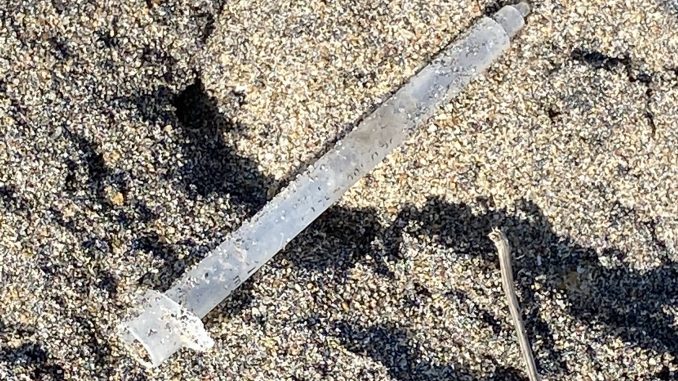
Pic: A jogger from ECR.
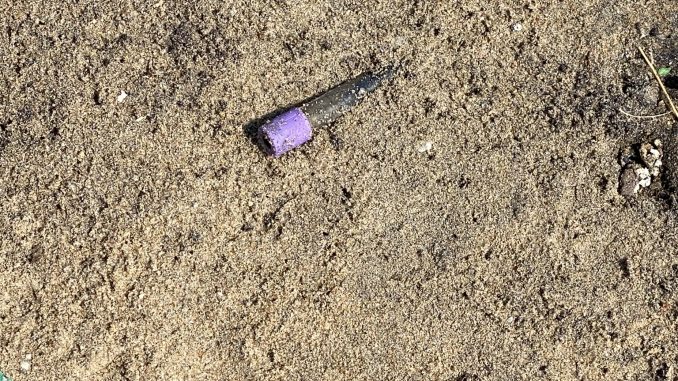
Syringe pumps spotted on the shores of ECR. “I used to jog barefoot, however, I had to switch to shoes for my own safety,” said a jogger. Pic: A jogger from ECR.
* Norm: The State Health Department should ensure implementation of the rule in all healthcare facilities or occupiers. TNPCB is vested with the responsibility to monitor the compliance of various provisions and conditions. Further, the TNPCB is mandated to take action against healthcare facilities or common bio-medical waste treatment facilities that violate segregation rules.
Reality: The lack of effective implementation has led to rampant illegalalities in the methods of disposal of the bio-medical waste in Chennai. TNPCB officials find it an arduous task to keep a tab on every single establishment considering how healthcare firms have mushroomed over the past few years.
“There are so many hospitals, clinics, pharmacies and private practitioners and it is practically impossible to investigate the practices of each, given our existing manpower and resources,” said P S Livingstone, Environmental Engineer from TNPCB.
Pugal added that action taken against violators has been poor and inadequate. “When officials inspect the spot after we’ve lodged a complaint, they ask us the whereabouts of the wrong-doers, instead of investigating themselves. I have not seen them punish violators so far,” he said.
* Norm: The duties of the healthcare facilities include ensuring that bio-medical waste is not mixed with municipal solid waste at source. Bio-medical waste generated in households during healthcare activities should also be segregated as per these rules and handed over in separate bags or containers to municipal waste collectors.
Reality: As some practitioners defy this rule, the burden falls on the conservancy workers like Sivaraman.
A TNPCB official indicated the remote possibility of generation of bio-medical waste from households who use dialysis equipment or syringes at home. He also pointed out that there were chances that these would get mixed with household waste at the point of handover to conservancy workers from local bodies. To tackle this, Greater Chennai Corporation (GCC) is constructing domestic hazardous waste collection centres in 15 zones and incinerators in several parts of the city in about four or five months.
Asked about the current disposal method of bio-medical waste from households, N Mahesan, Chief Engineer (Buildings and Solid Waste Management), GCC, said, “For now, we send the segregated bio-medical waste (from households) to hospitals for incineration. Municipal facilities for treatment are likely to be in place soon. Handling of bio-medical waste will be channelised once the private contractor takes up garbage disposal, which is likely to happen by June.” The official added that one incinerator is available in Manali and tenders for six or seven more have been passed.
However, there are serious arguments against incineration. Many experts say incinerating bio-medical waste releases hazardous substances into the air. Nitrogen oxide, heavy metals, particulates and dioxins are a few of the unhealthy gases that are released into the atmosphere during the burning process. Being exposed to these gases may lead to cancer, neurological disorders and damage the respiratory system.
Even otherwise, in the way that indiscriminate dumping of such waste occurs, there is an impact on the environment that is often forgotten. Vamsi Sankar Kapilavai, senior researcher, Citizen consumer and civic Action Group, said, “The bacteria and other microorganisms in the waste pollute the water bodies and impact the user. Plastic bio-medical waste such as saline bottles, injections and tubes, when discarded in landfills release heavy metals and volatile organic compounds over time into the atmosphere and there are several studies proving the same.”
Insufficient facilities and the way forward
Although incidents of irregular disposal have been reported to the concerned authorities, dumping continues unabated in Chennai. Experts attribute it to the lack of sufficient treatment centres and the lack of consistent enforcement of the rules.
According to the Biomedical Waste Management Rule, 2016, there should be at least one CBMWTF located within the respective state or union territory to cater to healthcare units situated at a radial distance of 75 km. However, in a coverage area, where there are less than 10,000 beds within a radial distance of 75 km, the existing CBMWTF in the locality may also be allowed to cater to the healthcare units situated within a radius of 150 km of its location, provided the biomedical waste generated is collected, treated and disposed of within 48 hours as stipulated under the rules.
In Tamil Nadu, there are 11 treatment centres and two among them cater to Chennai and nearby districts. Jawaharlal Shanmugam, a social activist and public interest litigant, who has filed several Public Interest Litigations (PILs) seeking regulation on bio-medical waste disposal, raises a flag on the total count and deems it insufficient.
“Two treatment facilities for three districts that house around 1,100 hospitals and clinics do not meet the demands. Besides, the waste has to be disposed of within 48 hours. Due to the unavailability of additional treatment plants and the requirement of transporting it within two days, haphazard disposal of bio-medical waste is happening in the city. There have also been instances of reselling used medical instruments, which aggravate the risk of health issues,” says Jawaharlal.
The activist strongly recommends increasing the number of treatment facilities in Tamil Nadu. Comparing Tamil Nadu with other Indian states, he said “This city and state are way behind in treating bio-medical waste. States such as Karnataka, Maharashtra and Kerala have more than 20 centres.”
Offering an alternative, eco-friendly solution, Vamsi calls for better management of equipment waste in general. Giving an instance of how Health Environment Climate Action Foundation, an NGO in Nepal, works with hazardous waste, he said, “They autoclave (sterilise at a higher temperature to kill bacteria and other organisms) and reuse it. However, we should look to reduce and phase out the use of such products; if we are unable to do that, we can at least try recycling.”
The expert strongly advocates using sustainable alternatives: “Although it may not be possible to substitute these completely with eco-friendly products, it is essential to choose the available ones that have lower carbon footprint.” For instance, plastic syringes can be replaced with steel syringes (needles can be discarded) and plastic casts with bio-degradable wooden ones.
A clear and complete article so far. Mistakes never happen, it is us who make mistakes. I feel so bad to see those highly qualified, people who call themselves as next to GOD (Doctors), are behind such irresponsible act.
A very extensive coverage on the topic. This is an alarming issue often left unnoticed. Journalists like you must be encouraged to bring more issues like these, unfortunately such initiation never happens. Kudos to the citizen matters for publishing such this article.